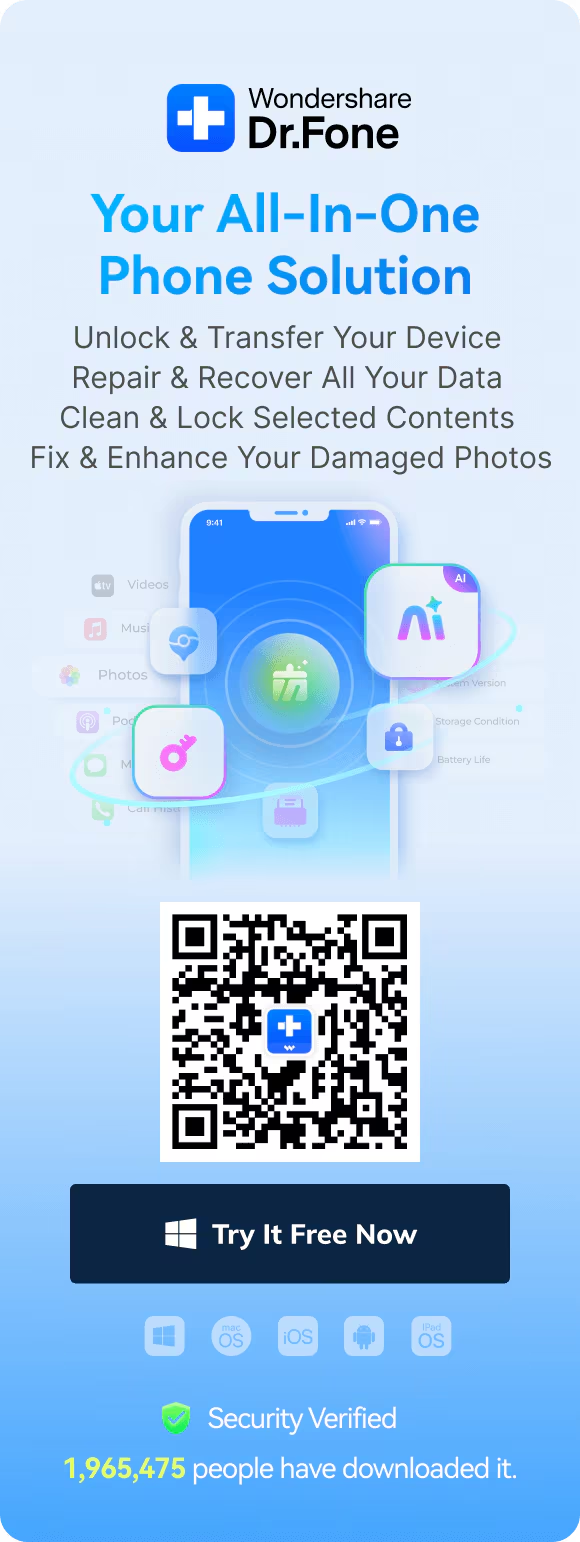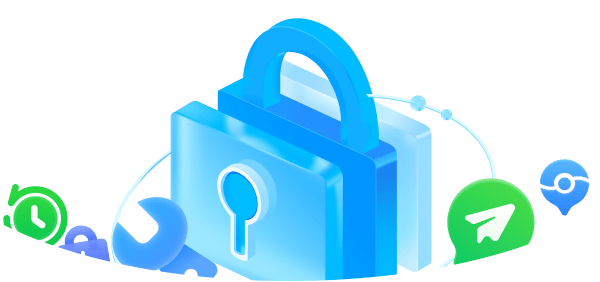An IP address, or Internet Protocol address, is a unique ID. It is assigned to your device when it connects to the internet. It is a digital home address. It enables websites, apps, and other online services to communicate with your device.
However, this digital footprint can also allow others to track your online activities and even locate you. Many people wonder, ""how do I hide my IP?"" Protecting your IP address is essential for maintaining your online privacy and security. It helps safeguard personal information, prevent tracking, and reduce the risk of cyber threats.
A good way to boost your device's security is Dr.Fone - App Lock. It's a versatile app with advanced privacy tools and user-friendly features. Dr.Fone makes online safety simple and accessible for all. It masks your IP address and boosts your device's protection.
In this article
Part 1: Understanding IP Addresses and Privacy Risks
An IP address (Internet Protocol address) is a unique numerical label assigned to each device connected to a network, such as your smartphone, laptop, or tablet. It serves as a digital identifier that allows data to be sent and received between devices over the internet. Think of it as your device's "address" on the internet, enabling seamless communication and connectivity.

Why Hide or Protect Your IP Address?
Your IP address is more than just a technical identifier; it’s a gateway to your online activity. It is important to know how do you protect your ip address. Leaving it unprotected can expose you to several risks, such as:
- Online Tracking: Advertisers and websites can track your browsing habits, building profiles of your preferences without your consent.
- Geo-Restrictions: Access to certain content may be limited based on your IP address, restricting you from enjoying global entertainment or services.
- Hacking Threats: Cybercriminals can use your IP address to target your device, gaining unauthorized access to sensitive data.
How IP Addresses Can Expose You
IP addresses provide detailed information about your location and online behavior. For example:
- Websites can use your IP address to determine your geographical location and customize content or pricing accordingly.
- Advertisers track your IP address to display targeted ads based on your browsing history.
- Cybercriminals exploit exposed IP addresses to launch attacks like Distributed Denial-of-Service (DDoS) or phishing schemes.
Part 2: Methods to Hide or Protect Your IP Address
Safeguarding your IP address is essential for maintaining online privacy and security. Each method below includes a brief introduction, followed by clear, actionable steps to help you answering a question "how do i hide my ip address on my phone”
1. Use a VPN (Virtual Private Network)
A VPN encrypts your internet connection and routes it through secure servers, effectively masking your IP address and keeping your online activities private.
Steps to Use a VPN on Your Phone
Using a VPN is a simple and effective way to hide your IP address. Follow these steps to get started on how do i make my ip address private:
- Download a reliable VPN app like ExpressVPN, NordVPN, or Surf Shark from your app store.
- Open the app, sign up, or log in to start using its features.
- Pick a server in a country or region of your choice to change your IP address.
- Tap the " "Connect" " button to secure your connection and hide your IP.
- Use an online tool like ""What is My IP?"" to ensure your IP has changed.

2. Enable Private Relay (for Apple Devices)
Apple’s Private Relay is a privacy feature for Safari users that encrypts your internet traffic and hides your IP address to prevent tracking and maintain anonymity.
Steps to Enable Private Relay on iOS
Enabling Private Relay on your iPhone is straightforward and ensures greater online privacy while browsing. Here’s how to make my ip private:
- Tap your name at the top to access your Apple ID settings.
- Select the Private Relay option under iCloud.
- Toggle the switch to enable the feature.
- Choose between ""General Location"" or ""Country-Specific"" to customize your privacy level.
- Open Safari and browse to confirm that your IP is now protected.

3. Proxy Servers
Proxy servers act as intermediaries, rerouting your internet traffic through another server to hide your IP address and enhance privacy.
Steps to Use a Proxy Server on Your Phone
Configuring a proxy server on your phone can help hide your IP address while online. Follow these steps to set it up and learn how do you block your ip address:
- Choose a proxy provider and get their server details.
- Locate the network you’re connected to and access its configuration settings.
- Tap Configure Proxy under the Wi-Fi settings.
- Input the server address and port number provided by the proxy service.
- Reconnect to the network and verify your IP has changed using an online tool.

4. Tor Browser
The Tor Browser uses a unique onion routing system to anonymize your online activity, making it nearly impossible to trace your IP address.
Steps to Use the Tor Browser on Mobile
Using the Tor Browser ensures maximum anonymity. Follow these steps to get started on how to make my ip address private:
- Find the official Tor Browser app in your device’s app store and install it.
- Launch the app and tap Connect to establish a secure connection.
- The Tor Browser will route your connection through multiple nodes.
- Begin exploring the web with enhanced privacy. Avoid sharing personal information.
- Regularly delete browsing data for optimal privacy.

5. Use Mobile Data Instead of Wi-Fi
Switching to mobile data assigns you a new IP address from your cellular provider, which can temporarily mask your Wi-Fi-based IP.
Steps to Use Mobile Data to Hide Your IP Address
Using mobile data instead of Wi-Fi is a quick way to get a new IP address. Here’s how do i block my ip address:
- Go to Settings > Wi-Fi and toggle it off.
- Go to Settings > Cellular > Toggle on Cellular Data.
- Use your mobile network to access the web.
- Use an online tool to confirm the change in IP.
- Remember that your IP address will revert when reconnected to Wi-Fi.

Part 3: How to Protect Your IP Address
Your IP address is a valuable piece of information that can be used to track your online activities and potentially expose your personal data. Being aware on how do i protect my ip address is crucial for maintaining privacy and securing online presence.

- Secure Your Network: Ensure your Wi-Fi network is protected by using strong passwords and encryption protocols such as WPA3. This will help prevent unauthorized access and safeguard your IP address from potential threats.
- Use Firewall and Security Apps: Install firewall apps and security software on your phone to create an additional layer of protection. These apps block unauthorized access attempts and help prevent exposure of your IP address to malicious entities.
- Avoid Public Wi-Fi: Public Wi-Fi networks are vulnerable to cyberattacks, as they lack adequate encryption. Avoid accessing sensitive information while connected to public networks. If necessary, use a VPN (Virtual Private Network) to securely hide your IP address and encrypt your data.
Part 4: Using Dr.Fone App - App Lock (iOS) for Enhanced Security
In an age where online privacy is more important than ever, securing your apps is one of the most effective ways to protect your sensitive information, including your IP address. Dr.Fone - App Lock (iOS) provides an easy and secure way to lock and encrypt apps that may expose your online activity. With its advanced features, you can prevent unauthorized access to critical apps, ensuring your privacy remains intact.
How Dr.Fone Can Help Protect Your Privacy
Dr.Fone - App Lock offers powerful features designed to enhance your privacy by protecting apps that contain sensitive data. Here's how it can help:
- Lock and hide sensitive apps: Prevent unauthorized access to apps that may reveal personal information or online activity, such as browsers or communication tools. This helps keep your digital identity secure.
- Encrypt app data: Safeguard sensitive app data to ensure that even if someone gains access to your device, they cannot access your IP-related or personal information.
Dr.Fone App - App Lock (iOS)
Enhanced App Security: Lock/Hide Apps Based on Time and Location
- Lock apps to prevent accidental deletions or downloads.
- Hide apps from the home screen for enhanced privacy.
- Face ID/PIN code protection for secure access.
- Supports iOS 16 and above.
Steps to Use Dr.Fone - App Lock for Enhanced Privacy
Protecting your apps with Dr.Fone is simple. Follow these easy steps to enhance your privacy :
01of 04Navigate to the App Lock tool
Open Dr.Fone and access the App Lock feature. This tool is designed to be user-friendly, guiding you through the process of locking apps with ease.

02of 04Add and organize apps into groups
Group apps for easier management and quick access. Organizing apps helps streamline the process and ensures you know exactly what is locked.

03of 04Set up Face ID or PIN
Secure these apps with Face ID or a PIN to ensure only you can access them. This adds an extra layer of security to your most important apps.

04of 04Use the Restrict Zone or Restrict Time Features
Further protect your privacy by limiting app usage based on specific locations or times. This ensures that apps can't be accessed when you're not around or at a certain location, providing additional control over your data.

Conclusion
Protecting your IP address is vital for your privacy and personal data. With increasing threats online, taking proactive steps to secure your IP address is crucial. Dr.Fone offers a full solution for privacy. It includes app locking and encryption. These features protect your data from unauthorized access.
We urge you to secure your IP address and use Dr.Fone - App Lock for total privacy protection. By utilizing these tools, you can ensure your online activity remains private and your digital identity stays safe.
FAQ
-
Q: Why is it important to protect my IP address?
A: By securing your IP, you avoid the risk of cyberattacks and data theft. To take your privacy a step further, Dr.Fone provides tools like App Lock, which lets you secure sensitive apps on your device and encrypt data.
-
Q: What can I do to secure my online activity when using public Wi-Fi?
A: Using public Wi-Fi without proper security can expose your IP address to potential threats. Dr.Fone - App Lock helps protect your privacy by locking critical apps that may expose your data.




























Selena Lee
staff Editor
Generally rated4.5(105participated)